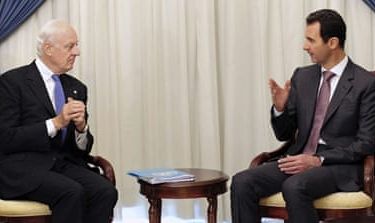Syrian Civil War: Negotiating in bad faith
The regime is using the peace process as a diversionary tactic, buoyed by recent battlefield gains such as Palmyra.

On April 10, United Nations Special Envoy Staffan de Mistura arrived in Damascus for meetings with regime officials in the run-up to the resumption of peace talks in Geneva on April 13. That very day, Syrian Prime Minister Wael al-Halqi said regime troops were preparing a major offensive to retake Syria’s largest city Aleppo.
This represents a clear rejection of De Mistura’s call for the “cessation of hostilities” to be maintained, and is yet another indication of the regime’s disdain for a negotiated settlement to the Syrian conflict.
Keep reading
list of 4 itemsThe Take: Thirteen years later, has the world forgotten Syria?
Jordan army kills drug runners at Syria border amid soaring Captagon trade
Assad arrest warrant: ‘Hope and pain’ for Syrian chemical attack survivors
It is unsurprising that Damascus would want to scupper the latest round of talks, because the focus is supposed to be a political transition that it has repeatedly rejected.
Not really a ceasefire
It has become a hallmark of the regime to do and say inflammatory things prior to and during diplomatic efforts to resolve the conflict, so it can be seen to participate in them while ensuring they do not progress.
Just days after the first round of talks in Vienna late last year, Syria’s Deputy Foreign Minister Faisal Mekdad said: “We are not at all talking about what is called a transitional period. There is no alternative to [Assad’s] leadership.”
In February this year, the president vowed to retake all of Syria amid efforts by his ally Russia and Western powers to secure the current “cessation of hostilities”, leading to a rebuke from Moscow.
In addition, Damascus entered last month’s Geneva talks reiterating that Bashar al-Assad’s fate – the biggest, most persistent obstacle to a negotiated solution to the conflict – is a “red line” that it will not discuss.
The fact that the Geneva talks are going ahead despite all this should not be cause for optimism, but a sign of the determination to continue the facade of a peace process.
The regime has repeatedly violated the “cessation of hostilities”, with the opposition saying on Sunday that it is close to collapse following the renewed use of barrel bombs.
Dozens of them were reported on Monday to have been dropped on civilian areas of Aleppo, only two days before peace talks began on Wednesday.
One of the main aims of the “cessation of hostilities” was to allow humanitarian aid to besieged areas. However, the UN and NGOs have said the regime is blocking access, delaying convoys, removing medical equipment and forbidding evacuations, violating international law and worsening the humanitarian crisis.
On March 31, Jan Egeland – the UN-appointed chairman of a task force on humanitarian aid – said Damascus had become less responsive to requests for aid convoys than it was immediately after world powers agreed on the “cessation of hostilities” in early February.
The previous day, senior UN official Stephen O’Brien described the situation in regime-besieged areas – “mere minutes’ drive away from UN warehouses in Damascus” – as dreadful.
OPINION: Syrian Civil War – US should not arm the rebels
In one of those areas, Daraya – besieged for more than three years – women last week wrote an open letter warning that they were “on the verge of witnessing” their children and relatives starve to death if aid does not reach them soon.
In one incident last month, three children in regime-besieged Madaya bled to death because they could not be evacuated for medical treatment after a bomb explosion.
Diversion tactics
These are not the actions and statements of a party that is willing to negotiate in good faith. On the contrary, the regime is using the peace process as a diversionary tactic, buoyed by recent battlefield gains such as Palmyra thanks to Russia’s direct military intervention, an increase in Iranian forces, and foreign militias such as Hezbollah.
However, it is precisely the regime’s reliance on foreign forces that makes its self-confidence so misplaced, because it is unable to take or keep hold of territory without them, and their presence in Syria will not be indefinite.
OPINION: The intentions of Syrian Kurds with self-administration
Indeed, Russia has partially withdrawn its forces, with many observers ascribing this, at least partly, to frustration with the regime’s belligerence at the negotiating table. Furthermore, the day after Halqi’s statement about the regime’s upcoming Aleppo offensive, Russia denied claims that it planned to storm the city.
Perhaps Assad has forgotten his admission last summer that his army is suffering from manpower shortages. He should also be mindful of reports of increasing disaffection within his own Alawite community, including once-unthinkable street protests, and the release this month of a document by Alawite leaders distancing themselves from his regime, a move some described as “deeply unusual”.

The fact that the Geneva talks are going ahead despite all this should not be cause for optimism, but a sign of the determination to continue the facade of a peace process.
And all this is happening while the regime tries to ensure that the focus is diverted away from the core issues of the conflict – a transition of power and Assad’s fate – to security and “terrorism”, meaning any opposition to the regime.
And why not, when such diversionary tactics have worked for neighbouring Israel, at the Palestinians’ expense, for almost a quarter of a century? “All process and no peace” is a tried and tested formula.
Sharif Nashashibi is an award-winning journalist and analyst on Arab affairs.
The views expressed in this article are the author’s own and do not necessarily reflect Al Jazeera’s editorial policy.
